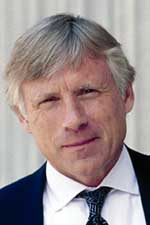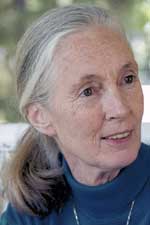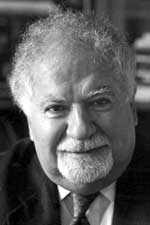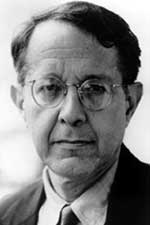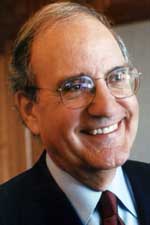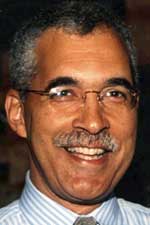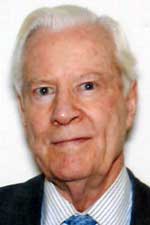TC Honors Medalists at 2004 Master's and Doctoral Convocations
The Teachers College master's and doctoral convocations will be held May 18th and 19th this year at the Cathedral of St. John the Divine. Once again there will be two separate master's convocation ceremonies in order to accommodate the large number of graduating master's degree candidates and their families. At the master's ceremonies, the TC Medal for Distinguished Service is presented to people who have made a difference in the field of education. The Cleveland A. Dodge Medal for Distinguished Service to Education, which is presented at the doctoral convocation, is in recognition of the efforts of someone working outside the field that has made a difference in education.
TC MEDAL FOR DISTINGUISHED SERVICE
LEE C. BOLLINGER
As former President of the University of Michigan, Lee C. Bollinger played an instrumental role in creating an educational atmosphere that encourages diversity, individuality and integrity. In the face of intense criticism, he maintained the stance that the diversity that affirmative action provides enhances the character and quality of American higher education. In the lawsuits against the University of Michigan for its affirmative action policies, his decision to stick to his guns is evidence of his belief that racial and ethnic diversity in education is not optional-it is vital. Bollinger compared affirmative action cases to Brown v. Board of Education, in their importance to social justice in education. His fight for affirmative action was one that affected not just one university, but all of higher education and all of American society.
JANE GOODALL
Jane Goodall is well known as one of the world's greatest anthropologists and researchers in the field of human development. Through her work with anthropologist and paleontologist Louis Leakey in Tanzania, she discovered important aspects of chimpanzee behavior that were not previously known. Their study of wild chimpanzees endeavored to shed light on the evolutionary past of humans. This research not only expanded the field of human development, but raised issues of environmental and humanitarian concern.
After earning her Ph.D. in ethnology from Cambridge University, she returned to Tanzania to continue research and establish the Gombe Stream Research Centre. Her research on chimpanzees in their natural habitat helped lay the foundation for all future primate studies. In 1977, she established the Jane Goodall Institute for Wildlife Research, Education and Conservation, now based in Silver Spring, Maryland.
She also established Roots & Shoots, an international environmental and humanitarian program for young people. Its mission is to foster respect and compassion for all living things, to promote understanding of all cultures and beliefs and to inspire individuals to act to make the world a better place environmentally and for both animals and humans.
VARTAN GREGORIAN
Vartan Gregorian has been involved in education throughout his career, in roles that ranged from student at Stanford, to professor at NYU to President of Brown University and President of the New York Public Library. He was first Dean of the Faculty of Arts and Sciences at University of Pennsylvania and four years later was named Provost. Today he is in a position to influence education from the philanthropic side as the twelfth President of the Carnegie Corporation of New York. He has also served as a member of the jury to select the architect or artist to build the memorial to the victims of 9/11. His experience sets him apart as a man of vision, high standards, and influence.
In his various capacities as an educator and leader, he has spoken of the importance of bringing together the various disciplines to create a deeper sense of learning and connection between subjects. This is crucial to developing well-informed, cultural leaders, scholars and thinkers in the years ahead.
JONATHAN KOZOL
Jonathan Kozol has been an educator, a writer and a social activist. He wrote about his first year of teaching a fourth grade class in Boston public schools in Death at an Early Age, which won the 1968 National Book Award and sold two million copies. He continues to write about the struggles of some of the poorest people in America-people he doesn't simply observe, but works to help through his own efforts as well as through his influence to obtain federal and private assistance.
During Boston's segregation crisis, he helped set up schools in storefronts and church basements. His concern for adult illiteracy in poor communities resulted in his designing a literacy plan for the nation's major cities. He helped spur federal and private action through his book, Illiterate American. He spent a good part of the winter of 1985 living in a homeless shelter in New York and wrote about the day-to-day struggle of some of the poorest people in America.
SENATOR GEORGE J. MITCHELL
Senator George J. Mitchell began his career in the Senate in 1980 when he was appointed to complete the remaining two years of Senator Edmund Muskie's term when he left to become Secretary of State. After retiring from the Senate 15 years later, he remained active in international politics and served as special advisor to President Clinton and as the secretary of state for economic initiatives in Ireland. In that role, Mitchell made recommendations for elections and the phasing out of guerilla weapons in Northern Ireland prior to the opening of peace talks. For his role, he received a number of awards, including the Presidential Medal of Freedom and the UNESCO Peace Prize.
Mitchell also served as chairman of the Sharm el-Sheikh International Fact-Finding Committee to examine the continuing crisis between the Israelis and the Palestinians. After the attacks on September 11th, he was chosen to be the overseer of the American Red Cross Liberty Fund that provided relief for victims and their families. He was recently named chairman of the Walt Disney Company.
CLAUDE M. STEELE
Claude M. Steele's work as the Lucie Stern Professor of Social Sciences at Stanford University has influenced the ideologies of social scientists regarding prejudice and stereotypes. His research on gender and racial achievement gaps has enhanced the understanding of the stereotype threat and its link to self-esteem and school achievement. Furthermore, his research on affirmative action and academic hiring goals clearly uncovers the reality that when given the opportunity to attend universities and placed in a supportive environment, people of color are able to succeed.
In addressing these long ignored issues, Steele has greatly impacted these neglected groups. As a result of his work, policy makers have narrowed the gaps in both educational and working environments, which has helped African-Americans and women succeed.
THE CLEVELAND A. DODGE MEDAL FOR DISTINGUISHED SERVICE TO EDUCATION
WILLIAM RUANE
William Ruane and his wife Joy created The Carmel Hill Fund, a foundation that generously supports research and initiatives that benefit the lives of children. In cooperation with the Children's Aid Society, the Ruanes established the Carmel Hill Project to revitalize West 118th Street in Harlem. The foundation's adoption of this block was focused on improving the educational experience of the children who live there. Through the foundation's efforts, all the children were brought together into one school versus 26 different schools, as was the previous case. The new school was outfitted with computers, and teachers were trained in uses of technology in the classroom. The library was enhanced with thousands of new books and a reading program was initiated.
As a result of the Ruanes' efforts, the children in the entire school showed improved Iowa test scores and dramatically improved New York State reading scores.
Other projects that the Ruanes have been involved in focused on issues of health, employment and housing services in addition to education. This is just one example of their commitment to the values of education and community improvement.
William Ruane is Chairman of Ruane Cunniff & Co., Inc. and the Sequoia Fund. He is also a member of Harvard Business School's Class of 1949; a focus of a book by David Callahan entitled Kindred Spirits: Harvard Business School's Extraordinary Class of 1949 and How They Transformed American Business that notes the staggering number of CEOs to come out of that class and the uniqueness of their personal bonds.
Published Sunday, Sep. 12, 2004
